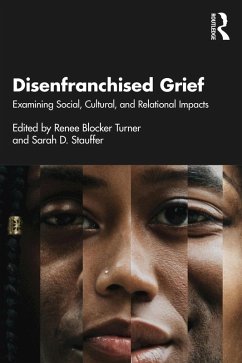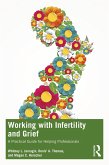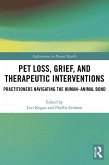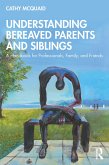Dieser Download kann aus rechtlichen Gründen nur mit Rechnungsadresse in A, B, BG, CY, CZ, D, DK, EW, E, FIN, F, GR, HR, H, IRL, I, LT, L, LR, M, NL, PL, P, R, S, SLO, SK ausgeliefert werden.
Erica Goldblatt Hyatt associate professor, Department of Obstetrics, Gynecology, and Reproductive Sciences in the Robert Wood Johnson Medical School at Rutgers University and author of Grieving for the Sibling You Lost
"This edited book is a powerful must-read for helping professionals to understand the multi-faceted experiences of disenfranchised grief - especially as the sociopolitical aspects of grief are often neglected. Readers will find their hearts and minds opened to not only new information, but also to the necessity of working for a more just world."
Anneliese Singh professor of social work and associate provost for diversity and faculty development/chief diversity officer at Tulane University and author of The Racial Healing Handbook: Practical Activities to Help You Challenge Privilege, Confront Systemic Racism, and Engage in Collective Healing
"Disenfranchised grief often includes the types of losses that you cannot give a greeting card for; losses that often lack a name or are experienced in silence or stigma. This volume, edited by Turner and Stauffer, should be on the shelf of every clinician working with grieving individuals. As a Counselor Educator who has taught a grief counseling course for over twenty years, this book addresses a myriad of topics left out by other books, such as intersectionality and grief; COVID and disenfranchised loss; the impact of disenfranchised loss on the body; racial trauma; spiritual trauma; and how disenfranchised grief impacts communities, such as the LGBTQIA+ community, folks with disabilities, African Americans, and military families. This book is a welcome addition to the existing grief literature and will help counselors and mental health professionals learn more about death and non-death losses as they bring care and compassion to those who have experiences grief on the fringes."
Michael M. Kocet assistant vice chancellor for graduate education at the University of Colorado, Denver, member of the AADA Grief Competencies Taskforce, and editor of Counseling Gay Men, Adolescents, and Boys
"Disenfranchised grief is so often unattended and disregarded in clinical work. Drs Turner and Stauffer have created an exceptional and timely resource for clinicians and clinicians-in-training to change that."
Martha Jo Atkins author of Sign Posts of Dying: What You Need to Know









